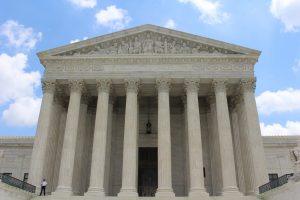On July 1st (unless otherwise noted) a number of new laws took effect in Virginia that may have an impact on you. Below is a summary of a few key pieces of legislation of which you should be aware.
Section 51.5-44.1 – It is a now a Class 4 misdemeanor to misrepresent your dog as a service dog to gain access to public areas with the animal.
SB 553 – Requires the Board of Health to promulgate regulations relating to audio and visual monitoring of residents in a nursing home by July 1, 2017. The regulations are to address privacy, notice, disclosure, liability, responsibility for equipment, costs and security, among other items.
Section 63.2-1806 – An assisted living facility is not required to provide or allow hospice care at the facility so long as this is disclosed to the resident prior to admission and is otherwise allowed by Federal law.
Section 64.2-2019 – A guardian of an adult incapacitated person is not permitted to ‘unreasonably restrict’ an incapacitated person’s ability to communicate with, visit, or interact with others with whom they have had an ‘established relationship’.
Sections 37.2-817, 37.2-837 and 37.2-838 – A person being discharged from involuntary admission in general or to mandatory outpatient treatment who does not have an advance medical directive must now be provided with a written explanation of the process for executing an advance medical directive and a form of an advance medical directive.
Sections 64.2-2011 and 64.2-2014 – The Department of Medical Assistance Services must now be notified of guardianship appointments, modifications and terminations.
Sections 64.2-2001 and 64.2-2009 – In a petition for a guardianship and/or conservatorship of an incapacitated individual who has not reached age 18, the statute clarifies that the court may enter an order for such guardianship/conservatorship appointing a guardian or conservator prior to age 18, but the court order should state whether the order is effective immediately or when the person turns 18.
Section 63.2-1605 – When investigating financial exploitation of an individual age 6o or older, if the department of social services or adult protective services believes there is ongoing exploitation totaling more than $50,000, then the police are required to be told so an investigation can ensue.
Section 8.01-220.2 – The principal residence held by tenants by the entireties (i.e., ownership between spouses) cannot be used to pay for one spouse’s debt incurred for emergency medical care unless the property is refinanced or transferred to new owners.
Section 23-38.81 – ABLE savings accounts are excluded as countable resources for means-tested public benefits. (Effective October 1, 2016.)
#elderlaw #guardianship #Virginialaw #incapacityplanning #specialneeds @bgnthebgn
 Check out the brief interview I did regarding my new role as President of the Virginia Academy of Elder Law Attorneys.
Check out the brief interview I did regarding my new role as President of the Virginia Academy of Elder Law Attorneys. 
 An update for those interacting with seniors and disabled individuals as it relates to the creation of special needs trusts. In September, the House of Representatives passed the Special Needs Trust Fairness and Medicaid Improvement Act (the “
An update for those interacting with seniors and disabled individuals as it relates to the creation of special needs trusts. In September, the House of Representatives passed the Special Needs Trust Fairness and Medicaid Improvement Act (the “ An
An  The
The  On September 20, 2016, the
On September 20, 2016, the  On October 1st (unless otherwise noted) a number of new laws will take effect in Maryland that may have an impact on you or those with whom you work. Below is a summary of a few key pieces of legislation of which you should be aware.
On October 1st (unless otherwise noted) a number of new laws will take effect in Maryland that may have an impact on you or those with whom you work. Below is a summary of a few key pieces of legislation of which you should be aware.